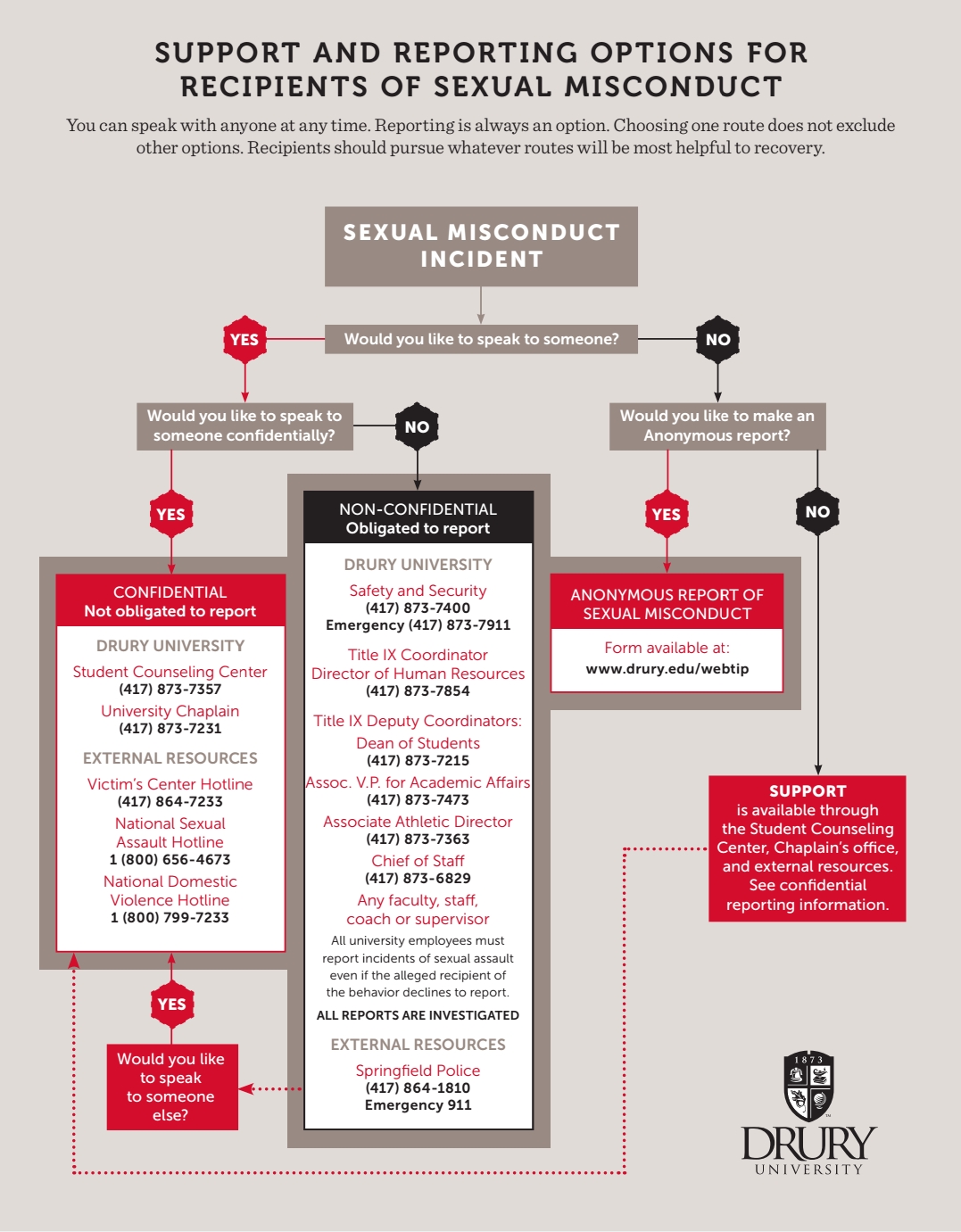
Are students safe? Drury administration breaks down Title IX, rights and due process
Front Page April 13, 2018, Comments Off 255Following the release of a Springfield News-Leader article on March 20 recounting the arrest of a Drury student for an alleged rape, many at Drury have felt uneasy and have expressed dissatisfaction in the current process.
In order to address some of these concerns, The Mirror staff spoke with Director of Safety & Security Serene Deeds, Title IX Coordinator Scotti Siebert, and Director of University Relations Mike Brothers.
The Mirror staff also spoke with several students about the process of a Title IX investigation and many expressed that they did not understand the process or their rights during an investigation.
The investigation process
The investigation is a very important part of the process, and is designed to be fair to both the reporting party and the responding party.
“Every individual is entitled to due process,” said Deeds. “These investigations are unbiased and I am very strict about making sure everyone understands their rights.”
Filing a Title IX complaint goes as follows:
A student has many options on how to file, according to Siebert. Check out the Support and Reporting Options for Recipients of Sexual Misconduct on the website for a complete list of methods at http://www.drury.edu/hr/pdf/titleix/misconductchart.pdf. A student can file either confidentially or non-confidentially, either with a form online or through a faculty or staff member at the University, including the counseling offices.
After that, the investigation begins. According to Siebert, the University has three obligations during this process. “We have an obligation to initially stop the behavior and to investigate it. If we determine there was a policy violation, we have an obligation to prevent its recurrence and an obligation to remedy the affects,” said Siebert.
- The office makes sure that they have the consent of the reporting party to use their name and ask them how they would like to proceed with the investigation.
- Assign investigator team.
- Interview reporting party and go through the policy so that the reporting party can understand their rights and options. At this time, the interviewee can reveal any witnesses or evidence that they have to corroborate that person’s statement.
- Issue a notice of investigation to the responding party. Any interim measure will be issued at that time as well, for example a no contact order, which means no intentional contact between the two parties. It might mean separate housing arrangements or moving to a separate section of a class.
- Interview responding party and go over their rights and options document.
- Interview witnesses of both parties and survey all evidence.
- The investigation report will be finalized, listing all the information from all the interviews. At the end of that report, the committee will make a recommendation about whether they think the evidence supports a campus violation.
- Once a determination is made by the Title IX office, the appropriate sanctions will be imposed.
The Title IX process is inherently different from the criminal justice system process. For the responding party to be charged with a crime, the investigators must believe that they have enough evidence to convict. Then, if a case goes to trial, a jury must determine “beyond a reasonable doubt” that the defendant committed the crime.
In the case of a Title IX complaint, the determination is based on the preponderance of evidence. This is a very different standard of proof than a law enforcement environment, because it means “more likely than not.”
Siebert compares this standard to a scale. “The scale has to dip slightly to one side or the other in order to make a determination,” said Siebert.
Unfortunately in many cases of sexual assault, there isn’t a lot of evidence one way or another.
“If there isn’t enough evidence to prove it, it doesn’t mean that the investigators don’t believe them. It’s often one person’s word against another,” said Siebert.
But even something small to tip the scale can help to make a determination.
Another difference between law enforcement involvement and Title IX is the processing time. For the police, an investigation can last as long as it needs to.
Until recently after the Betsy Devos update to Title IX in 2017, colleges were required to complete an investigation within 60 days after the report was filed. However, even with those mandates no longer in place, Siebert and Deeds claim that 60 days is still the target mark for their investigation.
FERPA and the Clery report
In addition, sexual assault cases have a statute of limitations with law enforcement and universities do not. If a person files a complaint about an issue that happened in the 1960’s, it will appear on the current year’s Clery report.
Deeds also reminds Drury students that arrests do not mean that a person has been charged.
The Family Educational Rights and Privacy Act or FERPA protects certain information during an investigation. The ones that Siebert and Deeds discussed are as followed.
- The names of both parties during the investigation have to be released to each other because the responding party has the right to know who has filed a claim against them.
- However, the University is unable to release the names of either party to the public.
- Any sanction for the responding party that does not directly affect the reporting party will not be released to the public or to the reporting party.
A Clery Act is a disclosure law on college campuses that requires that students, faculty and staff are notified when there is “an imminent threat” or notified as a “timely warning.”
In cases of sexual assault or misconduct, Drury’s Title IX team, working with Springfield Police, determines if the responding party is an imminent threat by reviewing past misconduct, seeing if any kinds of threats have been made, and by asking the reporting party if they believe that the responding party poses any kind of threat to the larger student body. If the answer is no, then usually a notice is not sent out.
A timely warning refers to something that the administration determines as an ongoing threat or something that may be repeated, like a break in or the recent “Peeping Tom” incident.
If a University chooses to notify their campuses via email, that is their preference. However at Drury, the administration usually chooses not to send out emails with little to no information about the incident because so much of the information is protected by FERPA.
“The idea is that if you’re telling people something, you should tell them something, otherwise you’re just scaring them. That’s the consideration. What useful and concrete information do you have to give them?” said Brothers.
However, Clery does mandate that each university update a daily crime report. In that report, you can find the date the incident was reported, the nature of the report and the location that the incident occurred.
You can find this document for 2018 on Drury Security’s website page.
The Clery report shows only the things that have been reported, not their outcomes.
And if for some reason the document online isn’t up to date, Deeds suggests that students and faculty come to her office and check the hard copy, because that version is required by law to always be updated.
Deeds said that if students are in danger, that she would not hesitate to let them know.
“There is no way I would put my campus at risk. These are my people, my students,” said Deeds.
Moving forward
In response to the recent Springfield News-Leader update, Brothers and the rest of the team are searching for a solution that notifies students when investigations will be in the media so that students aren’t blindsided.
“You should probably hear it from us first. That’s probably something we will institute going forward,” said Brothers.
Deeds would like to remind the campus that there is no condition where it is a survivor’s fault.
“Just because an individual has been drinking or using drugs, it doesn’t make that person responsible for other people’s actions,” said Deeds.
So some students may ask, why file a Title IX complaint?
Brothers answered, “To help and protect you, to help and protect your fellow students. And hopefully to make this campus a better place.”
Green Dot Bystander Intervention is an approach that suggests that everyone contributes to making a community a safe place, and that individuals should look out for each other and speak out when they see inappropriate behavior. Deeds, Brothers, and Siebert encourage students to participate.
“We can’t regulate the behavior of every single individual. But what we can do is establish a culture where people respect each other and do not tolerate unacceptable behavior,” said Siebert.
“I’m a Drury alum. I love this school. I always felt like, when I was here, that people took care of me. Everyone deserves to feel safe on this campus,” said Siebert.
Want to get involved in the conversation on campus? All students, staff and faculty are welcome to any of these campus events during Sexual Assault Awareness Week!
Monday: 7-9 p.m. showing of The Hunting Ground documentary in the Hoblit Suite.
Tuesday: 11-1 p.m. “It’s on Us” banner signing in the commons.
Wednesday: 2-3 p.m. sexual assault awareness demonstration, featuring an opening speaker and an open mic for anyone who wants to share in the FSC Circle.
Thursday: 4-6 p.m. self defense class in the Hoblit Suite.
Questions about the events can be directed to Micha Willis-White at mwillis03@drury.edu.
Below are several infographics with information regarding sexual misconduct and sexual assault awareness week.

Photo via drury.edu

Photo via Willis-White
Article by Mady McColm.
Revised 04/16/18 to add some clarifying details.